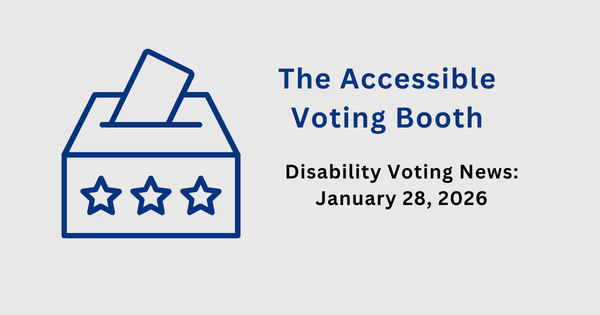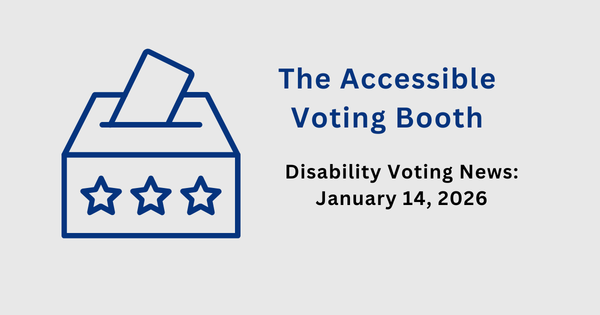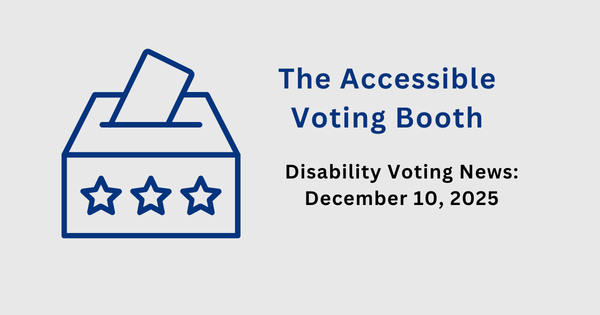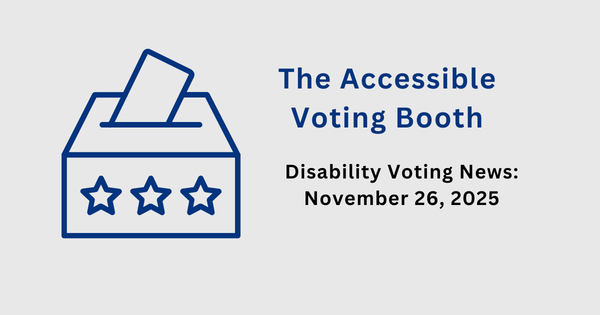Disability Voting News: July 23, 2025
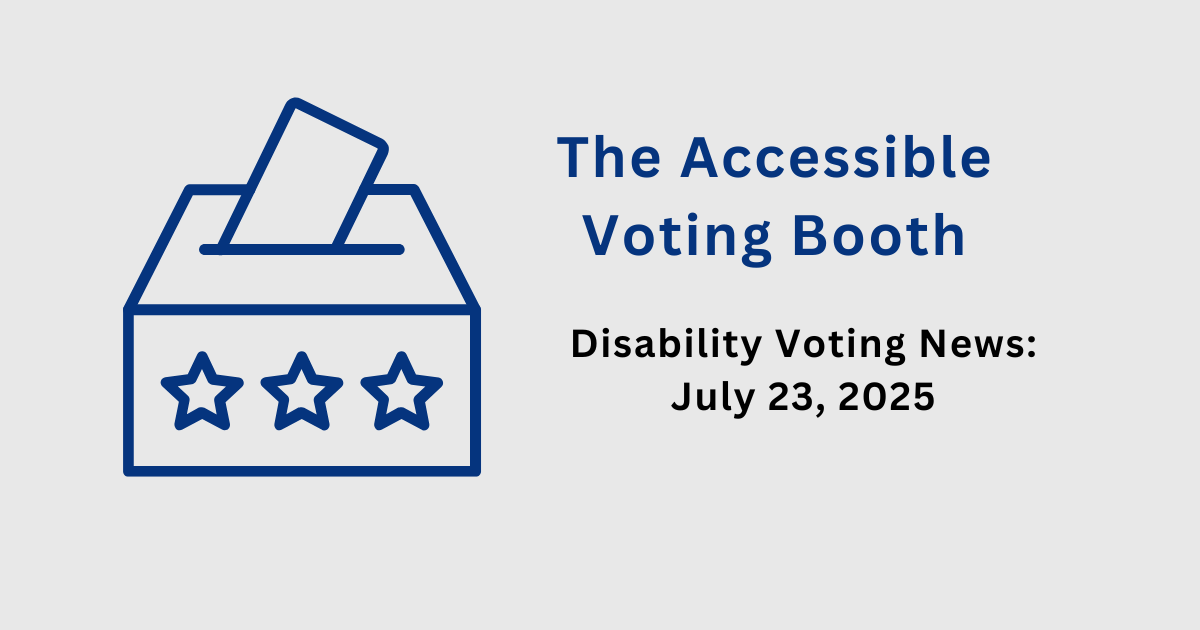
Welcome to The Accessible Voting Booth for July 23rd! I’m back from my brief hiatus to discuss updates out of Wisconsin and Texas.
Wisconsin town loses federal appeal over its ban on electronic voting machines (via Wisconsin Watch).
Last Monday, a federal appeals court ruled against the town of Thornapple, Wisconsin, which voted in 2023 to stop using electronic voting machines and only use hand-marked paper ballots. Under the Biden administration, the U.S. Department of Justice sued the town and argued that the decision to stop using electronic voting equipment violated the Help America Vote Act (HAVA), which requires each polling place to have a voting system that is accessible for people with disabilities. Surprisingly, despite the fact that the DOJ has pulled out of several voting lawsuits under the Trump administration, the DOJ continued with this case, even though the town of Thornapple is being represented by an attorney from the Trump-aligned America First Policy Institute.
According to sources, “The town argued that it wasn’t subject to the federal law’s accessibility provision because its use of paper ballots didn’t constitute a ‘voting system.’” This is such a perplexing argument–I’m certainly not a lawyer, but I don’t understand how one could argue that the way a town administers their vote couldn’t be considered a voting system. To me, a “system” doesn’t have to be a specific piece of technology (which they also likely have technology systems such as tabulators), but a standardized process that is determined at the jurisdiction level and implemented across precincts.
Regardless of their strange argument, we know that voters with disabilities in the town of Thornapple were impacted by this decision: the Chief Inspector of Thornapple, Suzanne Pinnow, testified that one blind voter had to have her daughter’s assistance to fill out her ballot, and Pinnow had to help a voter who had a stroke fill out his ballot by guiding his hand. Voters deserve access to a private and independent ballot, and voters with disabilities in Thornberry have clearly been denied that access.
HAVA is very clear in its requirement voting systems in federal elections. Title III states:
The voting system shall–
- (A) be accessible for individuals with disabilities, including nonvisual accessibility for the blind and visually impaired, in a manner that provides the same opportunity for access and participation (including privacy and independence) as for other voters;
- (B) satisfy the requirement of subparagraph (A) through the use of at least one direct recording electronic voting system or other voting system equipped for individuals with disabilities at each polling place; (note: this section is somewhat outdated and the vast majority of jurisdictions no longer use direct recording electronic voting systems, instead opting for ballot-marking devices)
- and (C) if purchased with funds made available under title II [52 USCS §§ 20921 et seq.] on or after January 1, 2007, meet the voting system standards for disability access (as outlined in this paragraph).
As we have discussed in previous iterations of the Accessible Voting Booth, the requirement for an accessible voting system does not extend to non-federal elections, but some states have implemented state laws that extend HAVA’s requirements for accessible voting equipment to non-federal elections.
Thornapple is “considering its options,” including appealing to the U.S. Supreme Court or continuing in a lower federal court, so we aren’t out of the woods yet. But hopefully the courts will continue to uphold that access to a private and independent ballot is enshrined in law.
Texas introduces legislation to conduct federal and state elections separately. (via Voting Rights Lab)
Among a slew of legislation pre-filed for a special session in Texas is HB52. This bill “would require Texas to conduct federal and state elections separately, including using separate ballots and voter registration lists, if the federal government passed voter registration or election laws that conflicted with state law.”
As we’ve covered in many previous issues, Texas Republicans are trying very hard to pass documentary proof of citizenship (DPOC) legislation that would require voters to provide their birth certificate, passport, or citizenship papers to vote. They were unsuccessful in passing HB16 which would’ve established this DPOC requirement back in June, but it’s clear that they will continue to try to push legislation that interferes with election administration and attempts to suppress the vote.
State documentary proof of citizenship legislation conflicts with federal law. We see this in Arizona, which passed its own documentary proof of citizenship legislation that resulted in bifurcated voting rolls. HB2492, passed in Arizona in 2022, required voters to provide DPOC when voting for president or by mail if they register using the federal voter form; required voters who registered before this requirement was put in place to provide DPOC to vote; and required voters on the state form to affirm their citizenship and provide DPOC. Courts blocked the provision that required voters to provide DPOC to vote in presidential elections and on the federal voter registration form. Because of that, Arizona has a bifurcated system where voters who provide DPOC are able to vote a full ballot, including in state and local races. Voters who don’t provide DPOC are only allowed to vote in federal races, including for President, U.S. Senator, and U.S. Representative. The Republican National Committee asked the U.S. Supreme Court to bar federal-only voters from voting for president and voting by mail, but they were not successful.
DPOC legislation is nefarious enough, but both the RNC and Texas have tried to define “federal-only elections” to exclude presidential elections, first in this lawsuit, then in Texas HB16 which failed to pass back in June. HB52 is clearly aimed at taking up the fight to exclude Presidential elections from being defined as federal elections: “the bill would exclude voting for electors for president and vice president from its definition of ‘federal election’ and define ‘federal office’ as only U.S. Senate and House of Representatives.”
You can read my previous analysis on documentary proof of citizenship legislation to understand why DPOC is voter suppression, pure and simple, and why it would make voting less accessible for millions of people. Texas Republicans clearly aim to continue trying for state-level DPOC legislation while trying to redefine federal elections to exclude presidential elections so that if Texas passes that legislation, federal-only voters can only participate in Senate and Congressional races.
This legislation is also concerning because of how it could impact other election law. As I explained above, the Help America Vote Act, including its requirements for accessible voting systems, only applies to federal elections. If HB52 is passed, does this mean that Texas would have a path forward to refuse to provide accessible voting equipment for Presidential elections? This would be devastating for Texas voters with disabilities. Let’s hope this legislation doesn’t pass and we don’t have to find out.
Thank you for reading this week’s edition of The Accessible Voting Booth! As always, if you’d like to support the newsletter and my work, here’s how:
- Subscribe to the Accessible Voting Booth newsletter.
- Share this newsletter with your network to spread the word about disability voting rights.
- Leave me a tip. Thank you for supporting my work!

